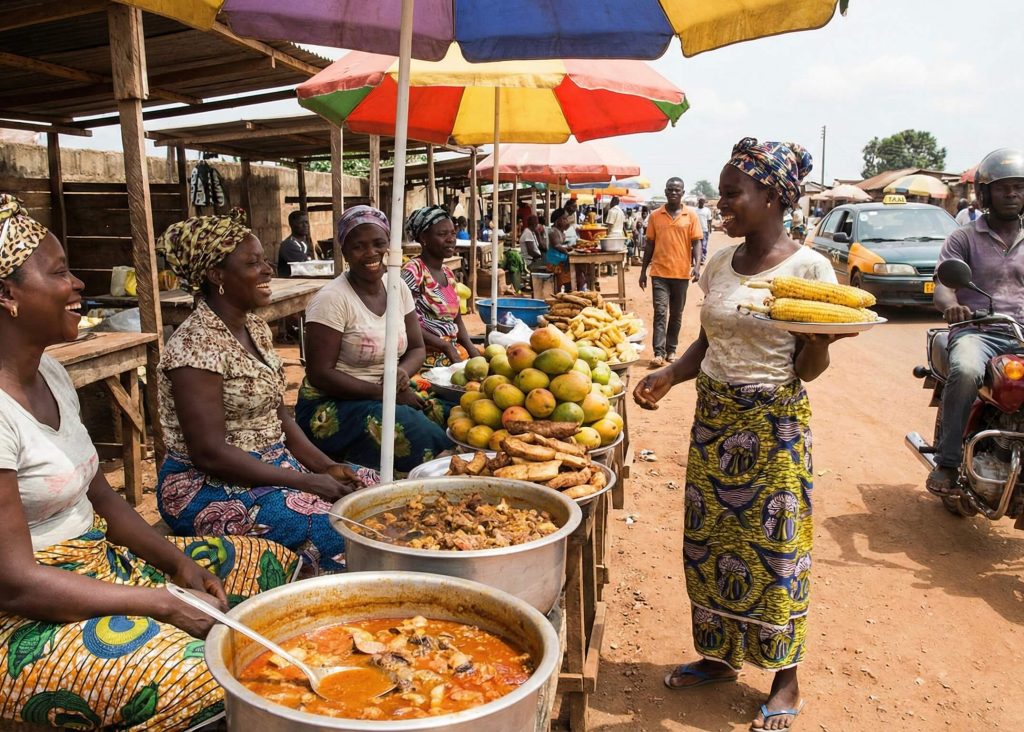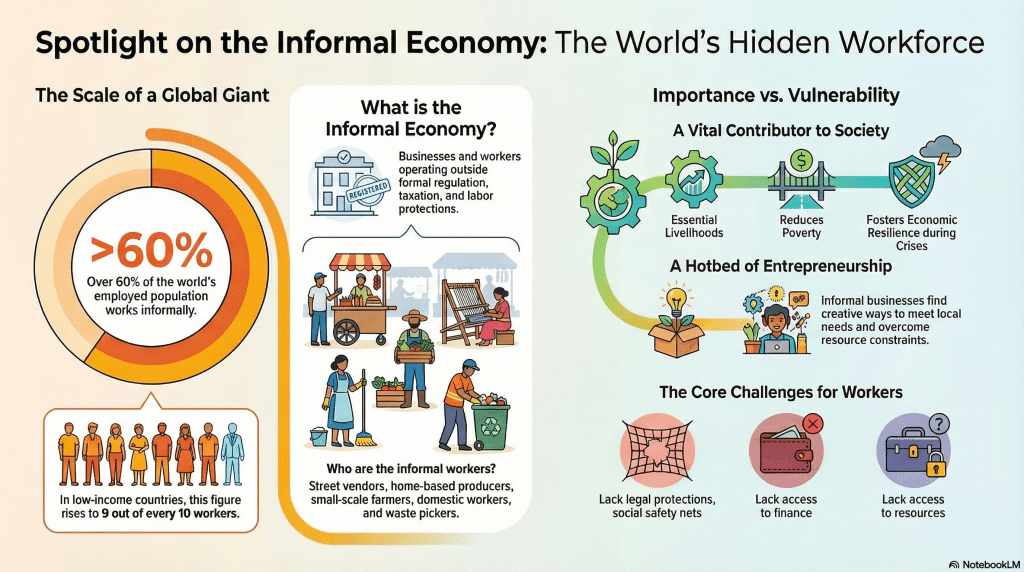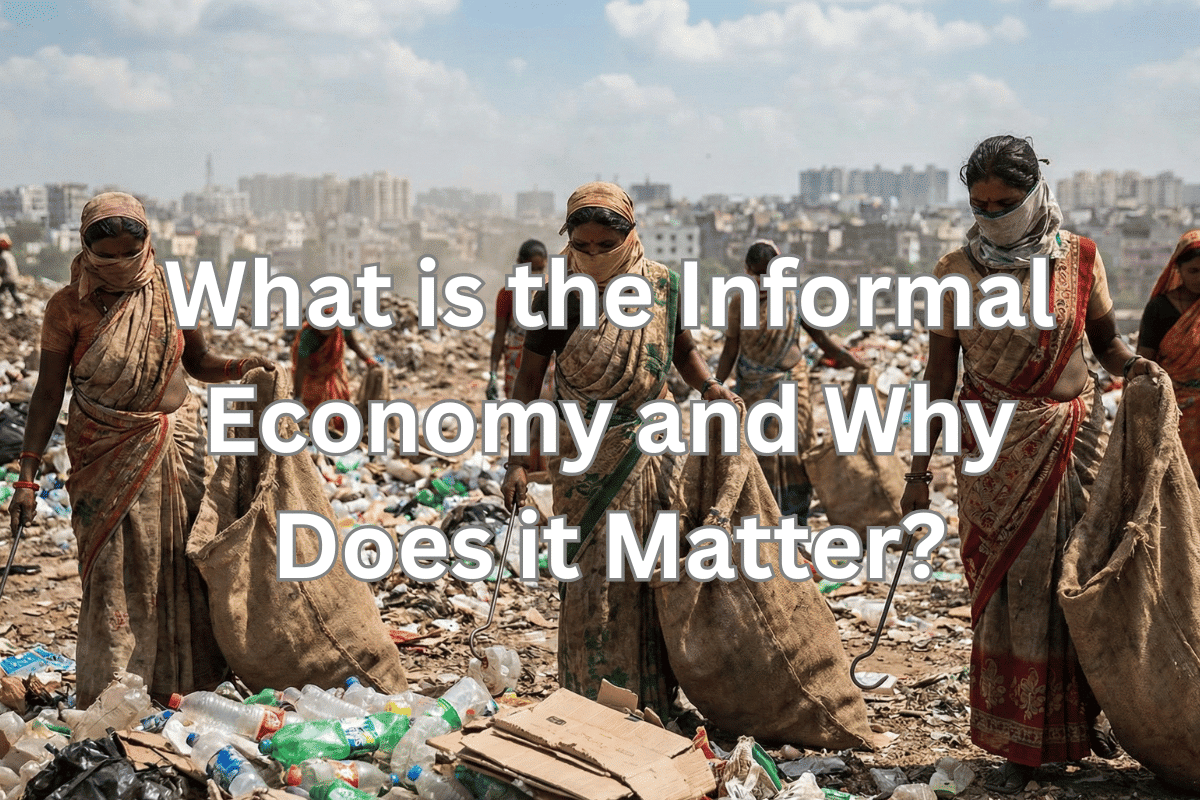The informal economy is a critical yet often overlooked part of the global economy. Yet it plays a significant role in the livelihoods of billions of people worldwide.
Still the informal economy is frequently absent from mainstream discussions about business, economics, and development. Read on as we explore what the informal economy is, its importance, and why it deserves more attention from policymakers, businesses, and society as a whole.
Table of Contents
- Defining the Informal Economy
- The Scale of the Informal Economy
- Does the Informal Economy Contribute to the Overall Economy?
- Why Does the Informal Economy Matter?
- Challenges Faced by the Informal Economy
- How Can We Support the Informal Economy?
- Deep Dive Podcast
- Related Questions
Defining the Informal Economy
The informal economy encompasses all economic activities, enterprises, jobs, and workers that are not covered by formal arrangements, either in law or in practice. This includes the absence of legal frameworks for enterprise operations or the lack of social and legal protections for workers. In simpler terms, the informal economy consists of businesses and workers that operate outside the formal structures of regulation, taxation, and labor protections.
Examples of the informal economy include street vendors, home-based workers, small-scale farmers, domestic workers, waste pickers, and countless others who contribute to the economy without being formally recognized.
These activities are not necessarily illegal; in fact, most are perfectly lawful. However, they exist outside the purview of formal systems, which means they often lack access to the benefits and protections that come with formal employment or enterprise registration.

Informal Sector vs. Informal Employment
It is important to distinguish between the terms “informal sector” and “informal employment,” as they describe different aspects of the economy and labor market.
The Informal Sector:
This refers to economic units—such as small businesses or enterprises—that produce goods or services for the market but are not formally recognized.
These businesses may lack proper registration, licenses, or compliance with labor laws and tax regulations. For example, a roadside food vendor or a small tailor shop operating without registration would fall under the informal sector.
Informal Employment:
This refers to jobs or activities for pay or profit that are not covered by formal arrangements, such as labor contracts, social security, or legal protections. Informal employment can occur in both the informal sector (e.g., a worker at an unregistered business) and the formal sector (e.g., a contract worker without benefits at a registered company).
The distinction is crucial because informal employment is not limited to the informal sector.
For instance, a construction worker hired on a temporary basis by a large, formal company but without a contract or benefits is considered informally employed, even though they work in the formal sector.

The Scale of the Informal Economy
The informal economy is vast and diverse, encompassing a significant portion of the global workforce. According to the International Labour Organization (ILO), more than 60% of the world’s employed population works informally. In low-income countries, this figure rises to 9 out of 10 workers.
Women are disproportionately represented in the informal economy, with 55% of working women engaged in informal employment. Additionally, nearly half of all informal workers—47%—are own-account workers, meaning they are self-employed and do not employ others.
These statistics highlight the sheer scale of the informal economy and its importance to livelihoods, particularly in developing countries.
Yet, despite its size, this sector remains underrepresented in policy discussions, business education, and economic planning.
Does the Informal Economy Contribute to the Overall Economy?
Absolutely. The informal economy contributes significantly to national and global economies, even though its contributions are often underappreciated or undervalued. Workers in informal employment play essential roles in our daily lives. They:
- Provide Food: Informal workers grow, sell, and distribute much of the food we consume, particularly in urban areas where street vendors and small-scale farmers are critical to food security.
- Manufacture Goods: Many of the clothes we wear and products we use in our homes are made by informal workers, often in small-scale, home-based enterprises.
- Offer Services: Domestic workers, caregivers, and waste pickers provide services that keep households and cities running smoothly.
- Manage Waste: Informal waste pickers and recyclers play a vital role in managing urban waste and promoting environmental sustainability.
The informal economy also generates tax revenue, as many informal workers and businesses pay indirect taxes through their purchases and transactions. However, because they operate outside formal systems, their contributions are often untracked or underestimated.

Why Does the Informal Economy Matter?
Despite being a massive part of the global economy, the informal sector remains largely unnoticed and underappreciated. In fact, if you were to ask most people about the size and significance of this sector, many would have little to no idea.
Here are some reasons why understanding the formal economy matters.
1. Livelihoods and Poverty Reduction
For billions of people, the informal economy is not just a way to earn a living—it is their only option.
In many low- and middle-income countries, formal jobs are scarce, and the informal economy provides a critical safety net. It enables people to support themselves and their families, often lifting them out of extreme poverty. Without the informal economy, unemployment and poverty rates would be significantly higher.
2. Economic Resilience
The informal economy often acts as a buffer during economic crises. When formal jobs are lost due to recessions, pandemics, or other disruptions, many people turn to informal work to survive.
This resilience was evident during the COVID-19 pandemic, when millions of workers who lost formal employment relied on informal activities to make ends meet.
3. Gender Equity
The informal economy is a lifeline for women, particularly in societies where cultural or structural barriers limit their access to formal employment.
Women in the informal economy often juggle work with caregiving responsibilities, and their earnings are vital to household income. However, their work is frequently undervalued and lacks social protections, leaving them vulnerable to exploitation and poverty.
4. Innovation and Entrepreneurship
The informal economy is a hotbed of innovation and entrepreneurship. Informal workers and businesses often find creative ways to meet local needs, adapt to changing circumstances, and overcome resource constraints. Street vendors, for example, are experts at identifying market demands and providing affordable goods and services.
5. Environmental Sustainability
Informal workers play a crucial role in promoting environmental sustainability, particularly in waste management and recycling. Waste pickers, for instance, collect and recycle materials that would otherwise end up in landfills, reducing pollution and conserving resources.
6. Social and Cultural Contributions
The informal economy is deeply embedded in the social and cultural fabric of communities. It supports traditional crafts, local markets, and community-based services that enrich cultural heritage and strengthen social bonds.

Challenges Faced by the Informal Economy
Despite its importance, the informal economy faces numerous challenges that limit its potential and harm the workers and businesses within it.
1. Lack of Legal Protections
Informal workers and businesses often operate without legal protections, leaving them vulnerable to exploitation, unsafe working conditions, and arbitrary eviction or harassment by authorities.
2. Limited Access to Finance and Resources
Informal businesses struggle to access credit, insurance, and other financial services, which hinders their growth and stability. They also face challenges in accessing infrastructure, technology, and training.
3. Social Exclusion
Informal workers, particularly women and marginalized groups, often face social stigma and discrimination. Their contributions are undervalued, and they are excluded from decision-making processes that affect their livelihoods.
4. Vulnerability to Economic Shocks
Informal workers lack social safety nets, such as unemployment benefits or health insurance, making them highly vulnerable to economic shocks, natural disasters, and public health crises.
5. Underrepresentation in Policy and Education
Business schools and economic policies tend to focus on the formal sector, neglecting the needs and realities of the informal economy. This lack of attention perpetuates inequality and limits opportunities for informal workers and businesses.
How Can We Support the Informal Economy?
To unlock the full potential of the informal economy and improve the lives of those who depend on it, we need targeted policies, investments, and initiatives. Here are some key strategies:
1. Legal Recognition and Protections
Governments should create legal frameworks that recognize and protect informal workers and businesses. This includes simplifying registration processes, providing access to social protections, and enforcing labor rights.
2. Access to Finance and Resources
Financial institutions and development organizations should design products and services tailored to the needs of informal businesses, such as microloans, savings accounts, and insurance. Governments can also invest in infrastructure, training, and technology to support informal enterprises.
3. Inclusive Economic Policies
Policymakers should prioritize the informal economy in national development plans and economic policies. This includes consulting informal workers and businesses in decision-making processes and addressing their specific needs and challenges.
4. Education and Awareness
Business schools, training programs, and public awareness campaigns should highlight the importance of the informal economy and equip individuals with the skills and knowledge to succeed in it.
5. Social Safety Nets
Governments and organizations should expand social safety nets to include informal workers, providing them with access to healthcare, unemployment benefits, and retirement savings.
6. Promoting Gender Equity
Policies and programs should address the unique challenges faced by women in the informal economy, such as caregiving responsibilities, discrimination, and lack of access to resources.
The informal economy is a vital part of the global economy, providing livelihoods, goods, and services to billions of people. It contributes to economic resilience, gender equity, environmental sustainability, and cultural heritage. Yet, it remains underappreciated and underserved.
By recognizing the importance of the informal economy and addressing its challenges, we can create a more inclusive and equitable economic system that benefits everyone. It is time to bring the informal economy out of the shadows and into the spotlight, where it can receive the attention and support it deserves.
References:
To learn more about the Informal Economy check out Women in Informal Employment: Globalizing and Organizing (or WIEGO.
Deep Dive Podcast
Check out our podcast to learn more.
At A Bus On A Dusty Road, we talk about travel, life, and ex-pat living. We are all about “Living Life As A Global Citizen.” We explore social, cultural, and economic issues and travel.
We would love to have you be part of our community. Sign up for our newsletter to keep up-to-date by clicking here. If you have any questions, you can contact me, Anita, by clicking here.
Listen to our Podcast called Dusty Roads. You can find it on all major podcast platforms. Try out listening to one of our podcasts by clicking here.
Subscribe to our A Bus On A Dusty Road YouTube Channel filled with great videos and information by clicking here.
Related Questions
Should I Brand My Small Business?
Branding is an area that many small businesses struggle with, yet it is a very important part of any business. Branding helps your business look and feel professional. To properly brand your business, you need to have a business name, logo, and tagline.
To find out more about why you should brand your business, you can read our blog on Guide To Branding Your Home-Based Business, What You Need To Know by clicking here.
What Is The Difference Between Working From Home and A Home-based Business?
Working from home is when your employer may have you work from home for a time. This is similar but not the same as telecommuting or remote working. On the other hand, a home-based business is where you are an entrepreneur. You own, run, and operate your own small business using your home as your base for your business operations.
You can read more by reading our blog Working From Home and Home-based Businesses, What You Need To Know by clicking here.

